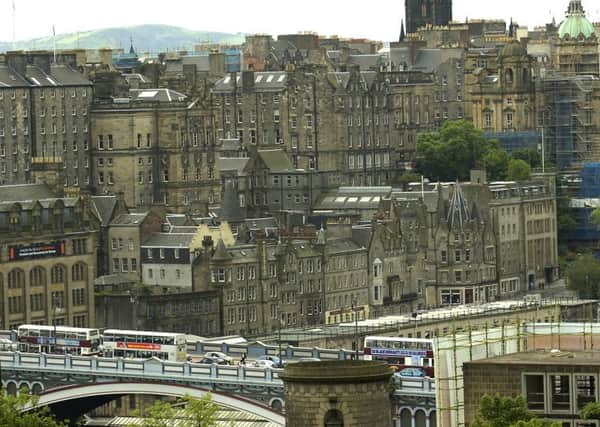New rules to safeguard Edinburgh cultural venues


A sea change in attitude from council officials, developers, public funders and the capital’s business community is being sought over the next 10 years to boost the year-round provision of arts in the city outwith the Edinburgh Festival.
It is set to be promoted as the city’s biggest single asset as part of a new campaign aimed at protecting public funding of the arts in the face of spending cuts and securing new sources of revenue, as well as creating a host of affordable new studio, rehearsal and performance spaces.
Advertisement
Hide AdEvery single person in the city would have access to “world class arts and culture provision” under the Edinburgh Cultural Promise blueprint, which has emerged from the biggest ever survey of artists, venue operators, promoters and event organisers - dubbed Desire Lines.
The “call to action from Edinburgh’s cultural community” pledges to raise the profile of the contribution the arts make to the city to help “strengthen the case for cultural investment.” Recent research found that the city’s nine leading cultural venues generate £194 million for the economy annually.
The steering group behind the project has produced 25 separate “ideas for action,” which are all said to be viable propositions, but are so far uncosted.
But they include encouraging the city council to reinstate the post of director of culture to ensure the sector has a place at the “top table” during budget negotiations, creating a city-wide register of buildings that could be taken over by promoters and performers, deploying publicly-owned buses and trams more to promote the city’s cultural highlights and ensuring major developments are “put on pause” if they threaten cultural spaces.
The local authority, which has been under fire over restrictive and inflexible noise and licensing policies, and other public bodies are to be asked to adopt an “enabling culture” for year-round cultural activities following years of protests about a lack of support for grass-roots arts organisations and the loss of key spaces.
The blueprint reveals that the Desire Lines process had found “considerable anger about recent decisions to close music venues due to single noise complaints, and a view that venue licensing, dealt with in a flexible and pragmatic way during the summer festivals, becomes much less straightforward outside this period.
Advertisement
Hide AdThe call to action states: “The key of arts and culture in the economic, social and cultural development of Edinburgh is significant.
“Yet the contribution of these industries towards improved health and wellbeing and in driving economic investment and tourism is not always fully recognised.
Advertisement
Hide Ad“By the demonstrating the long-term value of investment in the sector, we also aim to collaborate with the council and other funders to develop new and innovative approaches to resource allocation, ensuring that amidst tough decisions on public spending, access to creative opportunities is increased, rather than diminished.
“We are determined to ensure that short-term funding pressures do not become a barrier to future artistic excellence and public engagement in culture.”
Edinburgh International Book Festival director Nick Barley, one of those on the Desire Lines steering group, said: “This report is now a call to action, it’s not a consultation.
“It’s a plan with clear recommendations about what we should do as a city. More than 600 people have come together for this project and thought very deeply about it.
“This report is only part of a process. It’s not yet complete and it doesn’t have all the answers. It will require people to sign up to it and work out what it is going to mean for them.
“We don’t have a timeline for the recommendations, but in five years’ time we want to be able to be look back and say ‘how many of these proposals did we manage to deliver?’ The really important thing is that this was not set up in opposition to anyone. It’s much bigger than the city council, that’s very important.”
Advertisement
Hide Ad“What we are calling for everybody to sign up to this - the council, Scottish Government, Creative Scotland, universities, the NHS, the cultural sector and audiences - and promise we will work together to ensure we are going to work together to put culture at the heart of what the city does.
“We’re not saying that every single one of the ideas for action needs to be delivered, but if we deliver on a number of them we’ll really have got there.”
Advertisement
Hide AdThe Scotsman theatre critic Joyce McMillan will be hosting a debate on the Edinburgh Cultural Promise at Summerhall arts centre at 6.30pm on 19 May.
THE KEY IDEAS
* Ensure the city council has a director of culture.
* Appoint a cultural champion to be a high-profile advocate for the arts in the city.
* Creating a directory of angel investors for the arts.
* Stage an annual Dragon’s Den-style contest for funds.
* Compile a register of venues suitable for artists.
* Develop a city-wide public campaign to articulate the “true public value” of arts and culture.
* Introduce new safeguards for existing arts venues.
* Ensure all primary-age schoolchildren get to work with an artist or company.
* Twin well-funded organisations with smaller bodies for year-long partnerships.
* Create discounted access for year-round and local arts producers to the city’s major festivals.